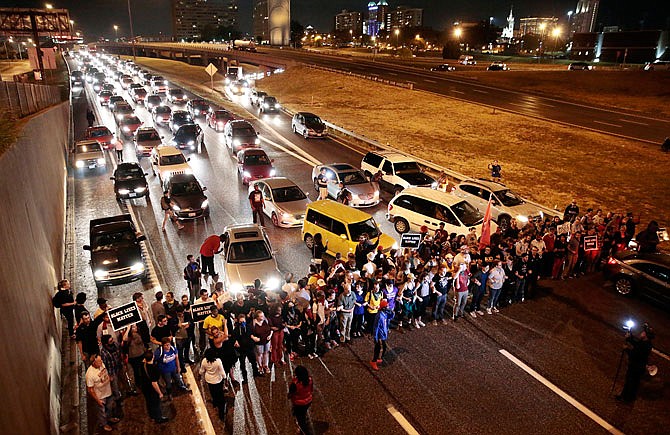State Sen. Jeanie Riddle told the Missouri Senate's Judiciary Committee on Monday that residents of her six-county district asked her to sponsor a bill that would "mandate an increased penalty and civil liability for blocking an interstate or limited-access highway, or access to emergency medical services."
Riddle, R-Mokane, represents Callaway, Montgomery, Warren, Lincoln, Audrain and Monroe counties.
She said she's received "many requests" to file the bill, especially from "the eastern part of my district, who were concerned about the blocking of interstates that occurred over the last several years."
She didn't specify the 2014 demonstrations after teenager Michael Brown was killed or after a St. Louis County grand jury chose not to indict the police officer involved in the Brown shooting, nor did she mention last year's demonstrations following a St. Louis judge's decision that prosecutors didn't show, beyond a reasonable doubt, that a police officer had committed a crime when he killed an unarmed man after a high-speed chase.
"The concerns (constituents) cited were in relation to being able to get medical treatment, and emergency services not being able to respond to emergencies, or being trapped on a roadway without the ability to exit from the location," Riddle said. "When protest leads to potential loss of life or an increased health risk, or injuries, many find that that is unacceptable - myself included."
Her bill would classify those acts as a Class A misdemeanor and require a fine of at least $1,000-$5,000, or a jail term of at least seven days, to a maximum of 30 days.
The Missouri Peace Officers Association supported the bill.
ACLU-Missouri did not.
Sara Baker, the organization's legislative and policy director, told the committee: "We are concerned about the impact this might have on First Amendment protections.
"People already are being charged and arrested based on other charges, for impeding the right of traffic on a highway (or) for trespassing."
She said the ACLU also is concerned "this (bill) is targeting a selected form of protest and might not be content-neutral."
Nuclear plant security
Riddle also wants colleagues to support a bill that would "create a new crime of trespass at a nuclear power plant, which would be a Class E felony."
Her proposal also would provide nuclear plant security guards with a "use of force standard," she said.
She reminded the committee members that the Callaway Energy Center at Reform - Missouri's only commercial nuclear power plant - already has seven layers of security and some of those were improved after the Sept. 11, 2001, terrorist attacks, on orders from the federal Nuclear Regulatory Commission.
Riddle's bill would authorize an armed nuclear security guard to use deadly physical force in self-defense, or to prevent an action that would constitute murder, voluntary manslaughter or assault.
The bill also would allow the armed nuclear security guard to use physical force to prevent an assault, kidnapping, burglary, arson, criminal damage to property, robbery, armed criminal action or criminal trespass.
Ameren Missouri officials testified at least six other states have passed similar laws, and the proposal is intended to protect the public's health and safety.
No one opposed the bill during Monday's hearing.
County jail reimbursements
Under current law, state government reimburses counties for at least some of their expenses for housing people in jail while they wait for their trial - if those jail inmates ultimately are convicted and sentenced to serve prison time.
State Sen. Andrew Koenig, R-Manchester, wants to limit that reimbursement to no more than "14 days for non-violent criminals. The idea is to not create a perverse incentive" for law enforcement and county officials to keep people in jail instead of letting them be released while they wait for their trial.
He said Missouri has the nation's "eighth highest incarceration rate," and "no other state reimburses their local governments" for holding people awaiting trial.
State Public Defender Michael Barrett supported the bill.
"These are people who have been charged with a criminal offense, but have not been found guilty," he testified. "What we're saying with this bill is, unless you pose a public safety threat, we're not, as a state, going to reimburse you for holding someone."
The bill would encourage the courts to release more people on bond so they can continue working and being with their families until they get to court, Barrett said.
Baker agreed.
"We should not be holding people in jail for non-violent offenses," she said.
However, Trent Watson, representing the Missouri Association of Counties, opposed Koenig's proposal.
"It's not up to the sheriff or anyone really at the county level, about who stays (in jail) or who goes," he told the committee. "Bond is set by a state employee - the judge."
The committee took no action on the 13 bills it heard Monday, but could vote later this week to send some of them to the full Senate for debate.

